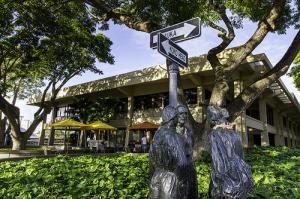June 19 public conference at Law School will explore justice gaps
University of Hawaiʻi at MānoaLeaders in Hawai‘i’s legal, judicial, business, academic and social services communities will examine ways to increase services to the state’s most vulnerable citizens as part of the day-long 2015 Access to Justice Conference, scheduled for Friday, June 19, at the William S. Richardson School of Law on the UH Mānoa campus.
The conference, "Narrowing the Justice Gap," is free, except for lawyers who seek Continuing Legal Education (CLE) credits, and is open to the public.
From 9:15 to 10:15 a.m., keynote speaker Jonathan D. Asher, Colorado's legal services executive director, will address today’s realities in seeking to provide justice for groups who often cannot advocate on their own behalf. The rest of the day features concurrent workshops on varied topics concerning access to justice for vulnerable people in Hawai’i.
The Access to Justice Commission was formed in 2008 by the Hawai‘i Supreme Court to look at ways to improve services to a wide range of groups without the resources to obtain legal services for themselves. Law School professors and students played an important role in analyzing the needs in Hawai‘i early on. Now, annually, the Law School hosts the conference that draws over 200 people each year, primarily from the legal community.
The conference begins at 8:30 a.m. and will include welcomes by co-emcees Law Dean Avi Soifer and Hawai'i Justice Foundation Executive Director Robert LeClair, as well as Hawai'i Supreme Court Chief Justice Mark Recktenwald, and Intermediate Court of Appeals Associate Judge Daniel R. Foley, who currently chairs the Hawai‘i Access to Justice Commission.
In the plenary session from 3:30 to 4:15 p.m., retired Hawaii Supreme Court Associate Justice Simeon Acoba, Asher, Foley and Recktenwald will discuss narrowing the access to justice gaps in Hawai'i, how individuals can assist, and how the Commission can meet some of the most recent challenges.
Recktenwald himself has often spoken about the pressing, ongoing access to justice needs in Hawai‘i. In his recent Commencement Speech to the 2015 Richardson graduating class, he said, “Ensuring that every person’s voice is heard when their legal rights are threatened is not a luxury – it is at the very foundation of the legitimacy of our courts, and therefore, our democracy. We are talking about fundamental human needs – housing, health care, the ability to participate in raising one’s child. Making such decisions without hearing every side of the story makes the promise of justice for all ring hollow.”
He recognized the Law School for being a strong partner in efforts at community outreach, including through the 60 hours of pro bono service each student must provide to a wide variety of community groups, plus the many Law School clinics that serve the underprivileged in Hawai’i in various ways.
Said Dean Soifer, who chairs the committee that organizes the annual conference, “Our committee members put a great deal of thought and effort into addressing many of the most pressing access to justice issues. Each year we make some progress, and the conference helps people learn and recharge. But our most vulnerable neighbors always face huge access to justice problems, both old and new, and we really cannot afford to ignore them.”
In 2014 the state was ranked third in the nation by the National Center for Access to Justice for an impressive list of Access to Justice initiatives including ranking first in the nation for its support of people representing themselves in civil court cases.
Topics at this year’s conference are:
- Engaging the business community in access to justice
- What’s mediation got to do with access to justice?
- Cultural and linguistic barriers for Micronesians to access justice
- Using non-attorneys to close the justice gap
- Access to justice for individuals with neurocognitive disorder (dementia) and their caregivers
- Delivering pro bono services to rural communities, including legal assistance for natural disaster relief
- Access to justice for juveniles and foster children
- Addressing lack of representation for non-English speaking residents
- Landlord-tenant, homelessness and other housing Issues
- Technology and access to justice
- Incubator projects and loan assistance programs
- Bankruptcy law and consumer debt Issues
For more information, visit: https://www.law.hawaii.edu/

